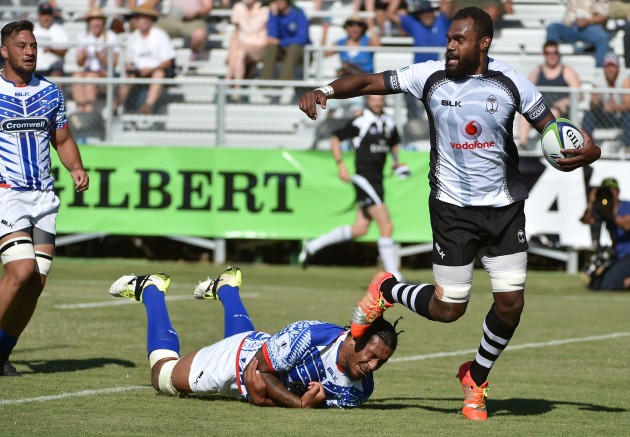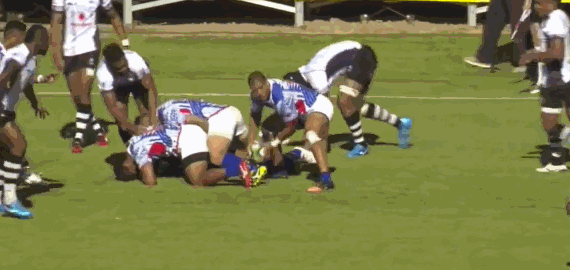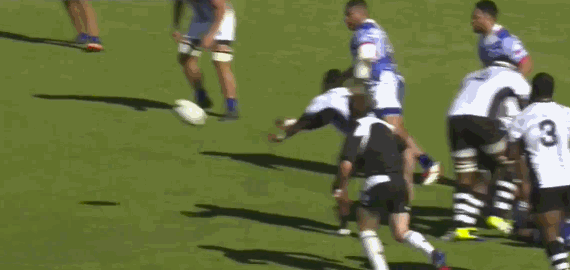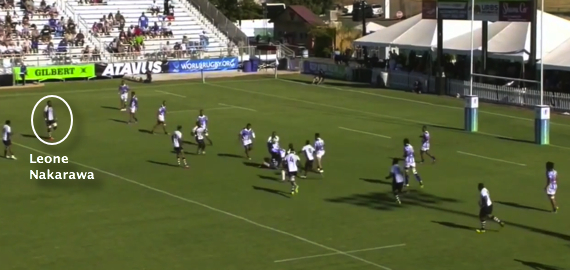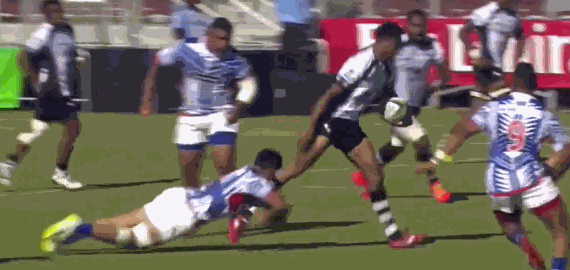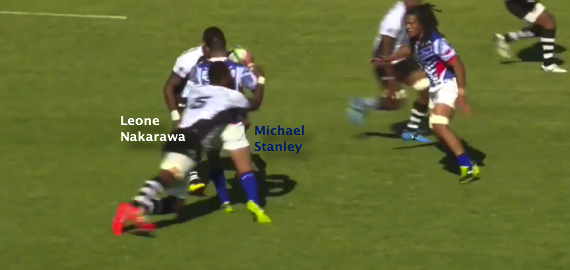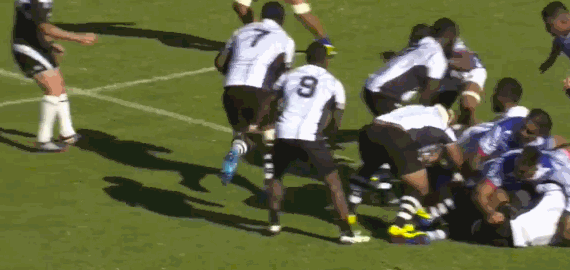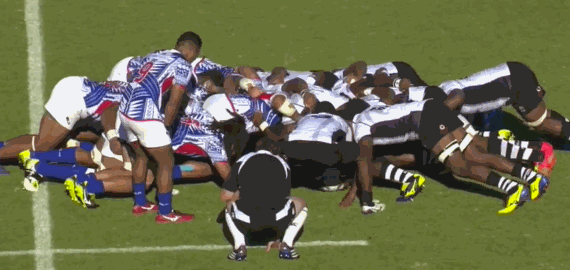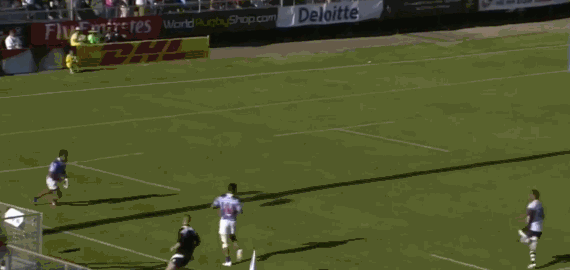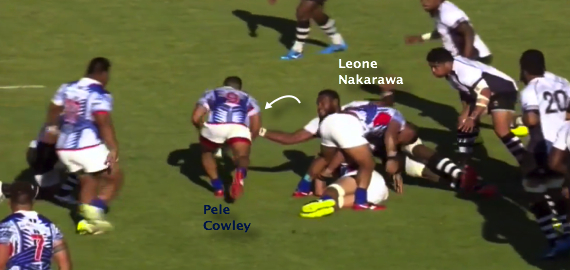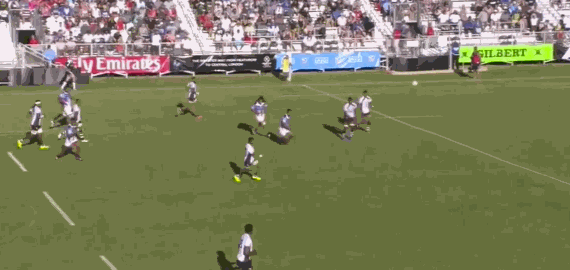Fiji have their work cut out alongside England, Wales and Australia in Pool A of the World Cup, but Leone Nakarawa seems in the mood to inspire an upset.
Forget the Rugby Championship and how the southern hemisphere giants are gearing up. Over the past fortnight, something just as significant in terms of the wider World Cup picture has been brewing.
The Pacific Nations Cup provides six sides with three fixtures and a gilt-edged opportunity to gel – to galvanise God-given talent with cohesion and structure. Canada, Tonga, Japan, USA, Fiji and Samoa are all dangerous underdogs. Each one could cause an upset at rugby’s global showpiece.
In precisely 52 days, Fiji get the first chance to do so in the tournament opener against England at Twickenham. This weekend in Sacramento, California – roughly 10,500 miles from Johannesburg where Richie McCaw sank the Springboks – they faced fellow South Sea Islanders Samoa.
A 30-30 draw registered extremely high on the scales for entertainment, ostentatious attack and mighty collisions – three concepts synonymous with the two teams in action. Though an abdominal injury meant Fiji’s monster wing Nemani Nadolo was absent, John McKee’s men put in a fine performance.
In a revelation that will come as no surprise whatsoever to fans of Glasgow Warriors, who watched the loping lock star throughout a PRO12-winning season, Leone Nakarawa was outstanding. Here is how he inspired his countrymen.
Adopting patterns
As we will reinforce later, Fiji do not want for individual brilliance. Patience and accuracy are areas in which they have come unstuck in the past. For that reason, this seemingly understated phase is an important example of composed organisation:
As skipper Akapusi Qera receives a pass from scrum-half Nemia Kenatale, he has support on either shoulder – hooker Sunia Koto on his right and Nakarawa on his left:
This is a pattern employed by many teams and its benefits are obvious here. As Qera carries and is tackled, Samoan back-rower TJ Ioane attempts to clamp onto the ball and force a turnover.
However, Nakarawa is wise to the danger and hits the ruck robustly, clearing out Ioane:
Similar industry led to Nakarawa’s first try minutes later.
Good things come to those who chase
Whoever lifts the Webb Ellis Cup will spend the competition punishing rivals’ mistakes. Fiji’s opening five-pointer demonstrated clinical opportunism:
Isolating the moment Peceli Yato hacks the loose ball through into space, we can see that Nakarawa has also shot up out of the defensive line to capitalise on Pele Cowley‘s wayward pass:
Panning out, it is possible to gauge how quickly Nakarawa catches up with Samoa second-row Teofilo Paulo and outstrips him, his long stride eating up the ground:
From a reverse angle, his supporting run can be tracked. Nakarawa makes Yato’s offload look spectacular due to an intelligent line tight to his colleague and a gorgeous piece of skill – reaching behind to catch the ball one-handed is not easy:
From the resulting restart, the Glasgow Warrior caused more trouble.
Launching from deep
During this clash, Fiji were typically ambitious. They often kept the ball in hand to counter from deep inside their own half. Nakarawa helped ignite one such attack following the above try:
Stationed across the field from where the restart is aimed, Nakarawa does not panic. On the contrary, he relishes the responsibility. Stepping up to take Vereniki Goneva‘s pass, he draws in Paul Perez and Alofa Alofa to put Asaeli Tikoirotuma into space:
Tikoirotuma makes a great deal of ground and links up with Yato and Qera inside him before Nakarawa’s intelligence and sleight of hand surface again:
He slows down to pick the ball off Qera on the floor…
…before slipping a gut pass out the back of his left hand into the midriff of loosehead prop Peni Ravai.
The body language of Kenatale suggests he is preparing to pass right into midfield. Samoa are understandably outfoxed:
This maintains the pace of Fiji’s continuity and a few phases later, when they are well on the front foot, they strike:
Two eye-catching off-loads from fly-half Ben Volavola and Kenatale create the score, but a pass out of contact is only as good as the support of its recipient.
Nakarawa begins a long way away from the initial break…
…and his line is fantastically judged – as is evident from an alternative viewpoint:
In a hard-hitting encounter, Nakarawa also contributed on the other side of the ball.
Mucking in on defence
Fiji will need leaders if they are to record more than one win at the World Cup, and this sequence outlines some decisive qualities on the part of their lanky number five:
First, Nakarawa beckons Qera over from the blindside to fill the guard position as Samoa move the ball right:
He then shoots up to shackle Samoa fly-half Michael Stanley, wrapping him up around the sternum to stop any potential offload:
As Stanley hits the ground, Nakarawa then rolls away from the tackle and Yato can compete for the ball:
Samoa’s phase-play was stunted completely and referee JP Doyle blew up for a scrum as the ball became unplayable. Nakarawa is not afraid of adding grunt work to the glamour.
Set-piece savvy
The appointment of Frans Ludeke, who won two Super Rugby titles with the Bulls between 2009 and 2010, is already showing encouraging signs.
Fiji will never bludgeon to victory on the back of their scrum and lineout. That said, if they manage to garner a platform consistently, they will be an infinitely tougher proposition. In this instance, Nakarawa helped execute a set-piece neatly:
Taking the throw of Koto, he transfers to Qera immediately to establish the maul:
Nakarawa’s long limbs ensure the ball is a long way out of Samoa’s reach, so even though he is dragged to the floor, Fiji remain in possession:
From there, they can escape the tight exchanges, spread the ball and do what they do best. Two phases later, full-back Metuisela Talebula scythes over out wide:
Against England, Wales and even Australia, set-pieces will probably be something Fiji need to get over with as quickly as possible. Even so, this penalty-winning nudge at a second-half scrum did demonstrate progress:
Earlier, more Nakarawa prowess had snared Fiji a fourth try.
Clever and canny in attack
Rarely can a tight-five forward have been such a focal point for a team’s attacking approach. Here, Nakarawa took this sliced clearance to spark Fiji once more:
Spinning through the tackle, Nakarawa keeps his feet, ties in two defenders and looks for support.
However, he does not spot a suitable pass and opts instead to take the ball to ground and set up the ruck. Fiji recycle and probe on either side before this carry from Tikoirotuma:
Nakarawa even has a role on this phase. His decoy line in front of Volavola serves to crowd the midfield and disorientate the defence just slightly:
From there, he can also attend the ensuing ruck:
Now this is very clever. Bending down at the breakdown, Nakarawa spots that Samoa’s fringe defence has fanned out, concerned about the threats on either flank.
There is space close to the ruck, so he puts a big right mitt on the ball. Behind him, Kenatale is digging for it in a bid to release his backs:
But the scrum-half is overruled by Nakarawa, who careers through:
While Samoa tracked back to halt this foray, they were in disarray. Kenatale finally spins it out from the next phase and centre Gabirele Lovobalavu picks off a ragged defence:
This put Fiji 24-10 up. There was still a long way for the match to run, though.
Discipline lapse
Nakarawa only lasted the entire 80 minutes in four of his 19 PRO12 appearances over the 2014/5 campaign and he looked tired as this match went on, mirroring his country’s slow finish.
With around five minutes to play, this penalty handed Samoa precious field position:
Diving in at the side of the ruck to impede Cowley, Nakarawa gives referee Doyle an easy decision:
Samoa kicked to the corner and eventually scored through Ioane to tie things up at 27-27. It was a shame given the quality of Nakarawa’s outing up until that point. Still, the setback represented a valuable lesson.
Fiji must minimise such indiscipline. The standard of the rest of their game deserves that much.
Final reminder
True to their naturally offensive mindsets, neither nation settled for the stalemate and Nakarawa put on a final flourish:
The offload did not go to hand, but did showcase Nakarawa’s vision and willing. A goose-step followed by a one-handed, American football-style quarterback pass that takes out two defenders hardly constitutes regular behaviour for a lock:
Then again, Nakarawa oozes the astounding, unconventional abilities that perenially characterise Fiji. With time together, they can add collective accuracy.
That makes Pool A even more deadly and ensures England, Wales and Australia can not relax.





